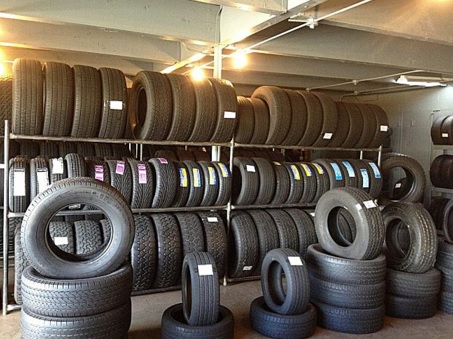Morris Tire Service: Where Accuracy and Efficiency Converge
The Ecological Advantages of Proper Tire Upkeep
Maintaining appropriate tire treatment is frequently forgotten, yet its impact on the setting is profound. Appropriate tire maintenance not just extends the life expectancy of tires yet also lowers landfill waste and contributes to boosted air quality.
Minimized Gas Consumption
Improving tire maintenance techniques can lead to a considerable decrease in fuel intake for vehicles. tire tracks morris il. Effectively filled with air tires guarantee ideal call with the roadway surface, lowering rolling resistance and improving fuel effectiveness. According to the United State Division of Power, underinflated tires can lower gas mileage by 0.2% for every 1 psi decrease in stress in all 4 tires. This might appear like a tiny percent, but when multiplied by the number of vehicles on the road, the collective effect is considerable.
Along with tire stress, regular tire turnings and placements additionally play an important function in fuel efficiency. Unevenly used tires can raise gas intake as the engine functions harder to preserve speed and traction. By maintaining proper alignment and revolving tires at advised periods, motorists can make certain also put on and prolong the life of their tires, eventually saving fuel and reducing their carbon footprint.
Extended Tire Life-span
Prolonging the life expectancy of tires is an essential aspect of reliable automobile maintenance practices that can generate price financial savings and ecological benefits in the future. By effectively keeping tires, chauffeurs can substantially prolong their use, minimizing the frequency at which brand-new tires need to be manufactured and old ones gotten rid of. This not only saves important sources however additionally minimizes the energy and emissions connected with tire production and disposal procedures.
Frequently examining tire pressure, revolving tires, and guaranteeing correct positioning are essential action in expanding tire life expectancy. Ample walk deepness is essential for ideal grip and security, yet it also plays a duty in the length of time tires can be made use of before requiring replacement. In addition, avoiding aggressive driving actions that accelerate tire wear, such as extreme braking and sharp turns, can better enhance tire resilience.
Ultimately, enhancing the long life of tires through positive upkeep not just profits the environment by decreasing waste and preserving sources but likewise causes set you back savings for car owners by postponing the demand for brand-new tire acquisitions.
Lower Emissions Outcome
Efficient tire maintenance techniques add to a decrease in emissions result, lining up with environmental sustainability goals in the automobile industry. By keeping ideal tire pressure degrees, vehicle drivers can assist reduce these negative ecological effects.
Additionally, well-maintained tires additionally boost traction and reduce rolling resistance, further boosting fuel efficiency. This, subsequently, minimizes the amount of exhaust gases released right into the ambience. Furthermore, ensuring tires are properly blown up and lined up can expand the life-span of the tires, minimizing the frequency of tire substitutes and the associated ecological costs of tire manufacturing and disposal.

Reduced Landfill Waste
Given the positive impact of proper tire maintenance on reducing emissions output, another substantial ecological advantage is the possibility for reduced garbage dump waste. By guaranteeing that tires are correctly inflated, aligned, well balanced, and revolved consistently, their life-span can be substantially prolonged.

Improved Air High Quality
Enhancing air quality with correct tire maintenance methods is an essential element of lasting environmental stewardship. When tires are underinflated, they develop more moving resistance, bring about enhanced gas consumption and higher exhausts of harmful pollutants such as carbon monoxide gas and nitrogen oxides. Effectively inflated tires not just improve fuel performance yet likewise lower the quantity of pollutants released right into the air.
In addition, well-maintained tires with appropriate his response step deepness Click This Link and alignment add to much safer motoring problems, lowering the likelihood of mishaps that can lead to the launch of added toxins right into the atmosphere. By extending the lifespan of tires with routine upkeep and turning, less tires are thrown out too soon, lowering the ecological influence of tire disposal and manufacturing processes.
Final Thought
In verdict, proper tire upkeep uses countless environmental advantages. It is essential for people to focus on tire upkeep as an easy yet reliable way to protect the atmosphere for future generations.
Proper tire maintenance not only extends the life-span of tires yet additionally lowers landfill waste and adds to enhanced air quality - discount tires morris il. By preserving proper alignment and revolving tires at suggested periods, vehicle drivers can make certain also put on and extend the life of their tires, inevitably saving gas and lowering their carbon impact
By properly preserving tires, motorists can substantially lengthen their use, minimizing the frequency at which brand-new tires need to be produced and old ones disposed of.Frequently examining tire pressure, rotating tires, and ensuring proper hop over to these guys positioning are essential steps in prolonging tire life expectancy. Additionally, making certain tires are effectively inflated and lined up can expand the life-span of the tires, decreasing the frequency of tire substitutes and the connected ecological prices of tire manufacturing and disposal.